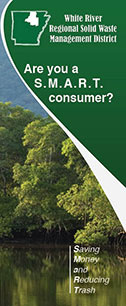Waste Reduction
For waste reduction services available to business, industry, schools and colleges, visit our business and industry page.
Though waste prevention strategies may differ from industry to industry, the following general tips apply to both consumers and businesses.
Whether at work, school or home, being S.M.A.R.T. (Saving Money and Reducing Trash) about what we purchase, use and discard is important to our budget as well as to our natural environment.
- When shopping, stick to your list – compulsive buying can break your wallet and weigh down your trash can.
- Keep reusable shopping bags with you. If you do not have them with you, ask the checker to minimize the number of bags you are given and recycle them later.
- Buy in bulk and in reduced packaging when possible – but purchase no more than you will use. Share any left-over quantities with friends or donate them.
- Purchase concentrated cleaners – the unit cost will be less.
- Purchase items in containers your local recycling center can recycle.
- Repair appliances and electronics when possible. When that is not an option, purchase long-lasting, energy efficient appliances. Refurbished is also good!
- Avoid single use and throw-away items whenever possible.
- Purchase long-lasting fluorescent bulbs and tubes - they will pay for themselves by reducing your electric bill.
- Use rechargeable batteries in everything – recycle them when they quit charging.
- Say “no” to junk mail. Visit DMAConsumers.org to get started.
- Make the jump to electronic bills, newspapers, magazines and books.
- Sell or donate unwanted food cans, clothes, shoes, furniture, appliances, etc. Resale shops, school pantries, charities need them. Many give tax receipts.
- Give gifts of your time – dinner out, a movie, help with a chore – most people already have too much stuff!
- Eliminate throw away gift packaging – use a re-usable gift bag, a basket or even a pretty scarf or towel for wrapping.
- Rent or borrow an infrequently used tool or appliance – make a list among your friends of things that can be shared.
- Try to avoid eateries that use throw away plates, flatware and napkins, and treat yourself to places with reusable linens and flatware. Practice this at home, too!
- Recycle everything you can! A list of centers in White River District’s ten-county service area and items they accept is contained in this web site.
Whether you are a business or a household, reducing the amount of trash you throw away keeps your waste disposal costs down and more money in your pocket.
Weight:
-47
